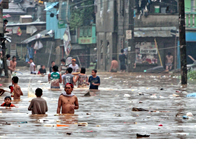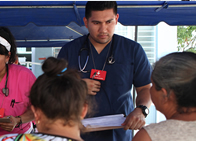DI 001 : DISASTER MANAGEMENT
Disasters are on the increase domestically and globally, due to climate changes which might be attributed to technological developments, and they come with social and economic consequences. Disasters either natural or man-made normally threaten the survival of the victims as well as put the dignity and livelihoods of victims to test and at times leads to a shift in socio- economic situations, unplanned urbanization, environmental degradation, climate variability as well as change, geological hazards and stiff competition of natural resources leading environmental degradation.
Course Description
Disaster management studies are recognized as a field that combines decades of proven record in responding to disasters by humanitarian actors and core principles of humanitarian action and draws on theoretical perspectives and conceptual understanding from a variety of academic disciplines. The scope of the study of disasters has grown tremendously from the initial focus on natural hazards to now include a broad range of human-induced disasters, complex emergencies and crises. The emerging dynamics of economic globalization and competition for resources and resulting displacement, forced migration, conflict, and environmental refugees have added considerable complexity to the realm of disaster management.
This integrated programme defines humanitarian response within the framework of an understanding of development, with vulnerability and disaster risk reduction as an integral part of development. This online course recognizes the vulnerabilities faced by the poor and marginalized and the disproportionate impact of disasters endured by them in the developing world. In this course, the study of disaster risk reduction, disaster response and post-disaster recovery will be grounded in the values of justice, equity and social inclusion. This course addresses all stages of disaster management in a comprehensive and holistic manner; including (i) pre- disaster preparedness and mitigation, (ii) rescue and relief in the context of disaster and (iii) post disaster rehabilitation, reconstruction and recovery.
Course Objectives
This Diploma Course in Disaster Management is designed to impart domain knowledge, capacities and skills to:
- Demonstrate a critical understanding of key concepts in disaster risk reduction and humanitarian response
- Recognize issues, debates and challenges arising the relationship between paradigm of development and disasters
- Critically evaluate disaster risk reduction and humanitarian response policy and practice from multiple perspectives
- Develop an understanding of standards of humanitarian response and practical relevance in specific types of disasters and conflict situations
- Critically understand the strengths and weaknesses of disaster management approaches, planning and programming in different countries, particularly their home country or the countries they work in, and
- Respond to disaster risk reduction initiatives and disasters in an effective, humane and sustainable manner.
Course Begins on 1st of every month for Six Months.
Course Level: Diploma Course
Cost: Amount €1000
To register for this course, kindly contact
Strategia Netherlands
Zuiderbrink 63, Gravenhage




